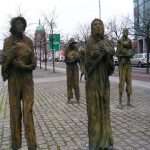The Fields
The lady’s memory stretches back into the 1920s and, despite her protestations that she forgets things, provides an encyclopaedic account of the 20th Century history of life in the townlands of her community. A farmer twenty years dead was recalled.
‘He never married, did he?’
‘Oh, he did. He married his childhood sweetheart, but it was very late in life’.
‘Why did he wait so long?’
‘Because her family decided she had to marry someone else. She had to wear flat shoes the day of the wedding to try and make the man she was marrying look taller. Her memory of her wedding day was of those shoes. Of course, by the time she was widowed and she married the man she had wanted to marry, he had been a bachelor for years. ‘Out of the frying pan into the fire’, she said.
It seemed sad, even in her closing years she had found no happiness. ‘But why did she marry the first man?’
The lady looked at me as if I was deeply naive. ‘Because of land, of course, his family had a good farm, and she was a respectable bride for him’.
How much land would be needed to prompt a family to compel their daughter to married a man who had obviously failed to attract anyone else?
Why is there such an attachment to land in this country? It’s not as though it confers great wealth on a person; Irish agriculture spent decades in the doldrums, and, even now, if it were not for the European Union’s farm support of agriculture, there would be a very small minority of farms that made any profit whatsoever.
There seems to be a longing far deeper than any desire for money in the wish to own land, some instinct that long pre-dates modern economics and assessments of a person’s worth. Anyone who has watched John B. Keane’s ‘The Field’ will have shared in a profound reflection on how deep runs the need to be the owner of acreage, no matter how small it be, no matter how rough the countryside.
Perhaps the desire derives from deeply ingrained folk memories of the Famine, perhaps it stems from the desire to hold a piece of one’s own country against those who for centuries occupied the land, perhaps it owes its origin to generations of Biblical storytelling and the tales of the people of Israel conquering the place they were promised. Whatever its source, it has been enough to cause unmeasurable unhappiness through the years.
Anyone who has lived in rural Ireland will know that young girls being compelled to marry for farms is a thing long past, but that John B.Keane’s Bull McCabe lives on in many communities. In a century’s time, there will still be tales of the wiles employed to gain a few acres.



Have an acre going spare if you want to buy it Ian!!!! not sure how much it would be worth, but a good few bob, you could buy a few cattle/sheep!!! give you something to do when your clerical duties give you an hour or two off!!!
I have a big enough flock to keep me busy.